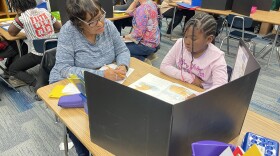In December 2012, Cuban-American poet Richard Blanco learned that he was chosen to be the Fifth Inaugural Poet of the United States. As inaugural poet, Mr. Blanco was asked to write a poem and read it at President Obama's second presidential inauguration in 2013. Mr. Blanco would be one of many “firsts” for the role: the youngest, the first immigrant, the first Latino and the first openly gay poet.
Blanco drafted three poems for the inauguration – One Today was chosen. Since then, he has read poems for other important public events, including at memorials for the Boston Marathon bombings and the re-opening of the US Embassy in Cuba.
In 2015, the Academy of American Poets named Blanco as its first Education Ambassador.
Home and belonging were always natural concerns for Mr. Blanco, who immigrated to the United States at 45 days old and grew up in a tight knit community of Cuban-Americans in Miami, Florida. From childhood into his forties, he says he had the idea that "to be American was some other narrative that I didn't belong to."
One Today, per Blanco, was a testament to the idea that "we all have a place at the table, we all belong to America, from the mothers at playgrounds to truck drivers, to doctors and lawyers, we all belong to that narrative." This narrative includes his story, his mother's story, that of immigrants, LGBT people and any other group that was not typically advertised in mainstream America, says Blanco.
Because the experience of writing and sharing poetry has been so fulfilling for him, both culturally and as a way to understand his own self, Blanco wants American children and educators to know that while the classics are important, they can also be "hard to connect with." According to Blanco, it makes more sense to start the process with poetry that is "relevant at the moment."
"We need to teach [poetry] the other way around. Begin with the contemporary stuff, and save the more complex, canonical texts, like Beowulf and Shakespeare for when we're in college, when we can really wrap our heads around it in a more significant way," he says. "When we realize that poetry is still being written, that it is still relevant, we'll have a different appreciation for the poetry of the past."
Blanco will be in Milwaukee Saturday evening to give a talk at Milwaukee Public Library's Centennial Hall. He will also be at Madison's Edgewood College February 22-25 as the 2016 Woodrow Wilson Visiting Fellow.






